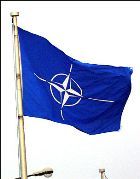NATO could intervene in Darfur conflict, secretary general says
LONDON, Feb 3 (AFP) — The North Atlantic Treaty Organization (NATO) could, if needed, help end the conflict in Sudan’s western Darfur region, NATO Secretary General Jaap de Hoop Scheffer said Thursday.
 Interviewed by BBC radio during a visit to Britain, de Hoop Scheffer said the transatlantic military alliance could play a role if the African Union and the United Nations requested it.
Interviewed by BBC radio during a visit to Britain, de Hoop Scheffer said the transatlantic military alliance could play a role if the African Union and the United Nations requested it.
“As far as Darfur is concerned, NATO is not involved, because the African Union is trying to set up a peace-monitoring mission. The Security Council is divided, and NATO will not go and rush into Darfur.
“NATO could, if the African Union and the UN would ask NATO, then NATO could, I think — but that question is not on the table — NATO could give support, in command and control and logistical support, to an operation,” he said.
“But I think that, quite honestly, we should leave it to the Africans and the African Union to find a way of solving this indeed tragic and horrendous conflict.
“But if African leaders would come, through the UN, to NATO, and ask NATO what could you do to support what we are doing, I think the Allies would have a very serious discussion,” the NATO chief said.
De Hoop Scheffer, who met here on Wednesday with British Prime Minister Tony Blair, said that the military alliance should develop a “more structural relationship” with the United Nations.
He recalled that NATO was operating under a UN mandate in several regions, including Afghanistan, Kosovo and Iraq.
The vast region of Darfur in western Sudan has faced what UN experts call a major humanitarian crisis, spawned by a February 2003 uprising by black Darfur locals against the Arab government in Khartoum.
A UN panel earlier this week blamed government forces and militia for indiscriminate attacks, including the killing of civilians, torture, enforced disappearances, destruction of villages, rape, pillaging and forced displacement.
However, it stopped short of accusing Khartoum and the militias of genocide against the Darfur population.
Blair raised concerns about Darfur when he visited Khartoum last October as part of an African tour, and his spokesman said Tuesday those concerns remain unchanged.
Around 70,000 people are estimated to have died in Darfur, many from hunger and disease, while some 1.5 million others have been displaced, many into squalid and dangerous camps.
